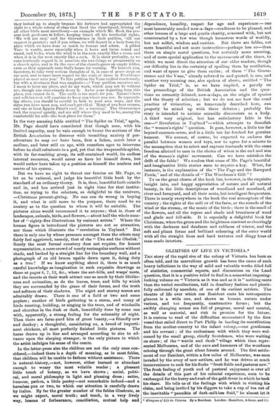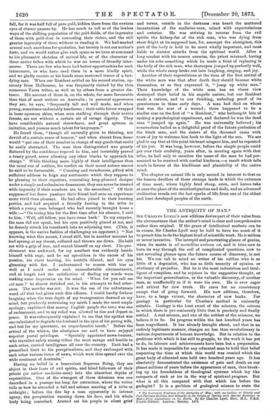GLIMPSES OF LIFE IN VICTORIA.* THE story of the rapid
rise of the colony of Victoria has been so often told, and its marvellous growth has been the cause of such
heavy inflictions in the way of solid and valuable works filled full of statistics, commercial reports, and discussions on the Land question, that it is a positive relief to find in a somewhat imposing- looking volume on "Victoria as it was and as it is" nothing more than the varied recollections, told in desultory fashion and plenti- fully enlivened by anecdote, of one of its earliest settlers. The theatre of life over which our Resident casts his retrospective glances is a wide one, and shows us human nature under various, and too frequently, unattractive forms ; but the swiftly changing scenes are full of progress, moral and mental, as well as material, and rich in promise for the future. It is curious to read of the difficulties encountered by the first vessel that sailed direct to Port Philip in landing its contribution from the mother-country to the infant colony,—one gentleman and his servant ; of the enthusiasm with which they were wel- comed by the small group, chiefly Scotchmen, who were waiting on shore ; of the "wattle and daub " village which then repre- sented Melbourne, and of the axes and hammers of the woodmen echoing through the great silent forests around. The first settle- ment of our Resident, within a few miles of Melbourne, was soon invaded by the army of new settlers, and he was driven at much inconvenience to seek for his flocks "fresh fields and pastures new." The fresh feeling of youth and of pastoral enjoyment is over all the details of this part of his colonial experience, soon to be exchanged for the hurry and rush of the gold-fever in which he took his share. He tells us of the feelings with which in visiting his claim, and being invited by his diggers to take a cup of tea out of the inevitable " pannikin of dark-milkless fluid," he almost let it • Glimpses of Life in Vittorio. By a Resident. London: Hamilton, Adams, and Co.
fall, for it was half full of pure gold, hidden there from the envious eyes of chance passers-by. He has much to tell us of the lawless ways of the shifting population of the gold-fields, of the ingenuity of those with gold-dust in concealing their riches, and the still greater ingenuity of those without in stealing it. We had marked several such anecdotes for quotation, but brevity is not our author's forte, and we would rather give such space as we have at command to his pleasanter sketches of animal life, or of the character of those native tribes with which he was on terms of friendly inter- course. There are few who have had better opportunities for such intercourse, or who have used them in a more kindly spirit. and we gladly receive at his hands some scattered traces of a fast- dying race. When our Resident settled on his second station, up- county from Melbourne, he was frequently visited by the then numerous Yarra tribes, as well us by others from a greater dis- tance. His account of them is, on the whole, far more favourable than that of most writers on Australia ; in personal appearance they are, he says, "frequently tall and well made, and when young, sometimes undeniably handsome ; their sable forms wrapped in loose opossum skins, when seen stalking through their native forests, are not without a certain air of savage dignity. They have considerable natural shrewdness, and great aptness in imitation, and possess much talent for languages."
He found them, "though all naturally given to thieving, not devoid of a certain sense of honour," and when absent from home would "put one of their number in charge of any goods that could be easily abstracted. The man thus distinguished was greatly flattered by the confidence reposed in him, and invariably proved a trusty guard, never allowing any other blacks to approach his charge." While thinking more highly of their intelligence than the usual run of settlers, his verdict on their moral nature cannot be said to be favourable. "Cunning and treacherous, gifted with sufficient address to feign any sentiments which they suppose to be pleasing to their superiors, concealing long-planned designs under a simple and submissive demeanour, they can never be trusted with impunity if their numbers are in the ascendant." Of their suppressed but fierce passions their friend had once an experience more vivid than pleasant. He had often joined in their hunting parties, and had acquired a friendly footing in the tribe to which a young man belonged who had recently.brought home a wife :—" On seeing him for the first time after his absence, I said to him, 'Well, old fellow, you have come back.' To my surprise, the man did not speak, but his eyes positively glared at me, and he fiercely struck his tomahawk into an adjoining tree. (This, it appears, is the native fashion of challenging an opponent.) "Not knowing what this meant, I stood still, but in another moment he had sprung at my throat, collared and thrown me down. Ile held me with a grip of iron, and seated himself on my chest. The pre- dicament was awkward, for my assailant was evidently beside himself with rage, and he sat speechless in the excess of his passion, his chest heaving, his nostrils dilated, and his eyes gleaming with fire. I endeavoured to reason with him as well as I could under such uncomfortable circumstances, and at length had the satisfaction of finding my words were making some impression on his mind. 'What for you call me old man?' he almost shrieked out, in his attempts to find utter- ance. The murder was out. It was the use of the unfortunate word old that had given such dire offence. I could hardly forbear laughing when the true depth of my transgression dawned on my mind, but prudently restraining my mirth I made the most ample apology ; explained that among English people the terra was one of endearment, and to my relief was allowed to rise and depart in peace. It was subsequently explained to me that the epithet was one calculated to degrade the husband in the eyes of his young wife, and but for my ignorance, an unpardonable insult." Before the arrival of the whites, the aborigines are said to have enjoyed superior postal privileges. "Specially appointed news-bearers, who travelled safely among tribes the most savage and hostile to each other, carried intelligence all over the country. Each had a prescribed limit to his peregrinations, and they exchanged with each other various items of news, which were thus spread over the wide continent of Australia."
Having no belief in a benevolent Supreme Being, they are abject in their fears of evil spirits, and blind followers of their priests (or rather medicine-men) into the absurdest depths of superstition. One of the strangest of these delusions was one described in a passage too long for extraction, where the writer tells us how he attended a full and solemn meeting of a tribe at midnight ; before the fire lay a man apparently in intense agony, the perspiration running down his face, and his whole body being convulsed. Around sat his people in silent grief
and terror, outside in the darkness -was beard the muttered incantations of the medicine-man, mixed with expostulations and outcries. He was striving to recover from the evil spirits the kidney-fat of the sick man, who was dying from sheer fright at its supposed lose, for, amongst the aborigines, this part of the body is held to be most vitally important, and most liable to sinister attacks from the spiritual world. After a long combat with his unseen enemies, the priest returned, having under his robe something which he made a feint of replacing in the body of the sick man, who thereupon jumped up perfectly well, while the whole camp broke out into laughing, singing, and joy.
Another of their superstitions at the time of the first arrival of the white man was that after death they should become white themselves, or as they expressed it, "jump up white men." Their knowledge of the white man has on closer view destroyed their belief in his angelic nature, but our Resident made a curious, and to our thinking, unfeeling proof of its genuineness in those early days. A man had died on whose foot was the scar of a wound ; there happened to be a similar scar on the foot of "a Resident," who bethought him of making a psychological experiment, and declared he was the dead man "jumped up again." He was universally believed ; his resurrection hailed as a delightful proof of the future perfection of the black man, and the sisters of the deceased came with tears of joy to welcome him back to the light of the sun. We are glad to say that at this point his heart misgave him, and he repented of his jest. It was long, however, before the simple people could get over their credulity, years after, in meeting again with that tribe, be had only to mention the name of the man he had per- sonated to be received with cordial kindness,—a result which tells much in favour of the kindliness and placability of the native mind.
The chapter on animal life is only second in interest to that on the human dwellers of those strange lands in which the extremes of time meet, where highly bred sheep, oxen, and horses take at once the place of the ornithorhynchus and dodo, and an advanced civilisation treads out the last sparks of life from one of the °Meat and least developed peoples of the earth.











































 Previous page
Previous page